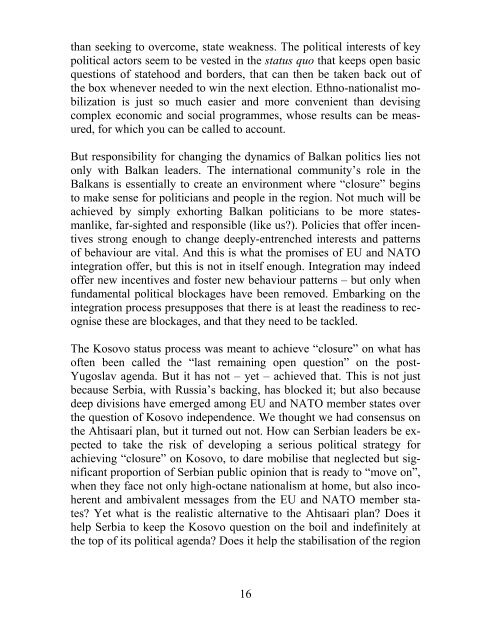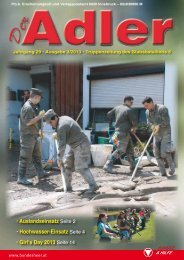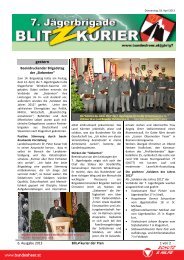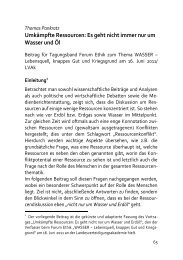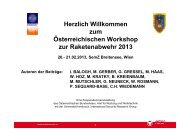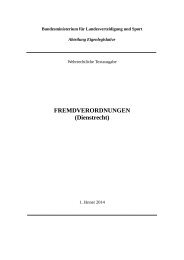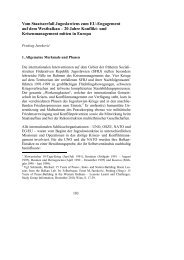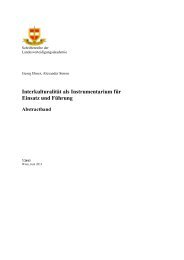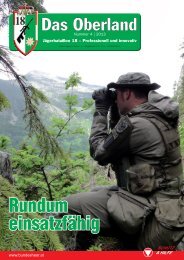Cutting or Tightening the Gordian Knot
Cutting or Tightening the Gordian Knot
Cutting or Tightening the Gordian Knot
You also want an ePaper? Increase the reach of your titles
YUMPU automatically turns print PDFs into web optimized ePapers that Google loves.
than seeking to overcome, state weakness. The political interests of key<br />
political act<strong>or</strong>s seem to be vested in <strong>the</strong> status quo that keeps open basic<br />
questions of statehood and b<strong>or</strong>ders, that can <strong>the</strong>n be taken back out of<br />
<strong>the</strong> box whenever needed to win <strong>the</strong> next election. Ethno-nationalist mobilization<br />
is just so much easier and m<strong>or</strong>e convenient than devising<br />
complex economic and social programmes, whose results can be measured,<br />
f<strong>or</strong> which you can be called to account.<br />
But responsibility f<strong>or</strong> changing <strong>the</strong> dynamics of Balkan politics lies not<br />
only with Balkan leaders. The international community’s role in <strong>the</strong><br />
Balkans is essentially to create an environment where “closure” begins<br />
to make sense f<strong>or</strong> politicians and people in <strong>the</strong> region. Not much will be<br />
achieved by simply exh<strong>or</strong>ting Balkan politicians to be m<strong>or</strong>e statesmanlike,<br />
far-sighted and responsible (like us?). Policies that offer incentives<br />
strong enough to change deeply-entrenched interests and patterns<br />
of behaviour are vital. And this is what <strong>the</strong> promises of EU and NATO<br />
integration offer, but this is not in itself enough. Integration may indeed<br />
offer new incentives and foster new behaviour patterns – but only when<br />
fundamental political blockages have been removed. Embarking on <strong>the</strong><br />
integration process presupposes that <strong>the</strong>re is at least <strong>the</strong> readiness to recognise<br />
<strong>the</strong>se are blockages, and that <strong>the</strong>y need to be tackled.<br />
The Kosovo status process was meant to achieve “closure” on what has<br />
often been called <strong>the</strong> “last remaining open question” on <strong>the</strong> post-<br />
Yugoslav agenda. But it has not – yet – achieved that. This is not just<br />
because Serbia, with Russia’s backing, has blocked it; but also because<br />
deep divisions have emerged among EU and NATO member states over<br />
<strong>the</strong> question of Kosovo independence. We thought we had consensus on<br />
<strong>the</strong> Ahtisaari plan, but it turned out not. How can Serbian leaders be expected<br />
to take <strong>the</strong> risk of developing a serious political strategy f<strong>or</strong><br />
achieving “closure” on Kosovo, to dare mobilise that neglected but significant<br />
prop<strong>or</strong>tion of Serbian public opinion that is ready to “move on”,<br />
when <strong>the</strong>y face not only high-octane nationalism at home, but also incoherent<br />
and ambivalent messages from <strong>the</strong> EU and NATO member states?<br />
Yet what is <strong>the</strong> realistic alternative to <strong>the</strong> Ahtisaari plan? Does it<br />
help Serbia to keep <strong>the</strong> Kosovo question on <strong>the</strong> boil and indefinitely at<br />
<strong>the</strong> top of its political agenda? Does it help <strong>the</strong> stabilisation of <strong>the</strong> region<br />
16


